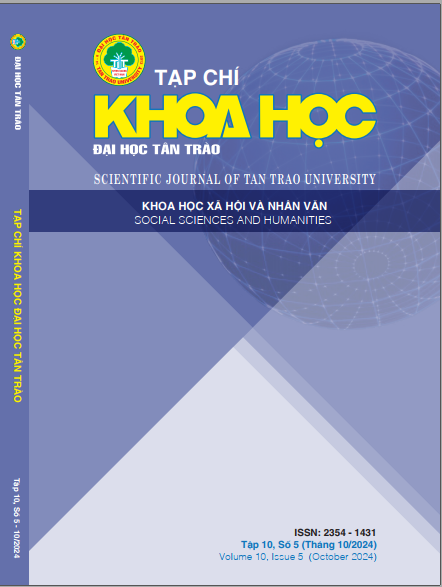A A CONTRASTIVE ANALYSIS ON SEMANTIC FEATURES OF ENGLISH AND VIETNAMESE IDIOMS DENOTING ANIMALS
DOI:
https://doi.org/10.51453/2354-1431/2024/1226Keywords:
Contrastive analysis, Idioms, Animals, English and VietnameseAbstract
This study investigates the semantic features of idioms related to animals in both English and Vietnamese, aiming to identify the similarities and differences in how these two languages employ animal-related expressions to convey cultural values, beliefs, and behaviors. Idioms are an integral part of linguistic expression, reflecting unique cultural contexts. A comparative analysis of idioms involving animals in English and Vietnamese will provide insights into the linguistic and cultural nuances that shape these expressions. The study employs a qualitative and contrastive methodology, analyzing selected idioms through semantic categories such as symbolism, metaphorical meaning, and cultural associations. The analysis reveals that while both languages use animals to express human characteristics, the specific animals and the qualities they represent often differ due to cultural influences. for instance, English idioms frequently use animals like lions and foxes to symbolize courage and cunning, whereas Vietnamese idioms employ animals such as buffaloes and chickens to denote hard work and resilience. The study highlights the influence of cultural contexts on the selection of animals in idiomatic expressions and offers insights into how idioms can reflect cultural beliefs. this research contributes to the fields of linguistics, translation studies, and intercultural communication, offering a deeper understanding of animal symbolism in language.
Downloads
References
Ammer, C. (2013). The American Heritage dictionary of idioms. Houghton Mifflin Harcourt.
Baker, M. (1996). In other words: A coursebook on translation. Routledge.
Cambridge International Dictionary of Idioms (1998). Cambridge University Press.
Dang, T. K. C. (2024). Challenges of Translating Idiomatic Expressions: A Cross-Linguistic Analysis at a University in Hanoi, Vietnam. International Journal of Social Science and Human Research. http://dx.doi.org/10.47191/ijsshr/v7-i10-39
Evans, V., & Green, M. (2006). Cognitive linguistics: An introduction. Lawrence Erlbaum Associates.
Fernando, C. (1996). Idioms and idiomaticity. Oxford University Press.
Geeraerts, D. (2010). Theories of lexical semantics. Oxford University Press.
Gibbs, R. W. (1994). The poetics of mind: Figurative thought, language, and understanding. Cambridge University Press.
Gibbs, R. W. (2006). Metaphor interpretation as embodied simulation. Mind & Language, 21(3), 434–458. https://doi.org/10.1111/j.1468-0017.2006.00285.x
Giang, D. N. (2011). Synonyms and idiomatic variations in English and Vietnamese. VNU Journal of Science, Foreign Languages, 27(1), 273-280. Retrieved from https://js.vnu.edu.vn/journal/ForeignLanguages/
James, C. (1980). Contrastive analysis. Longman.
Katz, A. N. (1998). Idioms: Structural and psychological perspectives. Journal of Pragmatics, 30(3), 387–390. https://doi.org/10.1016/s0378-2166(98)00020-4
Kövecses, Z. (2010). Language, thought, and culture: An introduction to linguistic anthropology. Routledge.
Lakoff, G., & Johnson, M. (2003). Metaphors we live by. University of Chicago Press. https://doi.org/10.7208/chicago/9780226470993.001.0001
Le, H. M. (2018). Animal symbolism in Vietnamese and English idioms: A comparative analysis. International Journal of Linguistic Research, 12(3), 210-225. Retrieved from https://linguisticresearch.org/articles/animal-symbolism
Nguyen, L., & Do, M. (2017). Cultural reflections in Vietnamese idioms: A study of societal values. Journal of Vietnamese Cultural Studies, 5(2), 145-160. Retrieved from https://journal.vietnamculturalstudies.vn/articles/145
Nguyen, V. K. (2022). A study on English animal idioms from the perspectives of cultural metaphor and their translation into Vietnamese. Journal of Foreign Language Studies, 69-85. http://dx.doi.org/10.56844/tckhnn.68.131
Nguyễn Lân. (2004). Từ Điển Thành Ngữ và Tục Ngữ Việt Nam. Nhà xuất bản Văn Hóa Thông Tin.
Nguyễn Đức Dân. (2005). Thành Ngữ Học Tiếng Việt. Nhà xuất bản Đại học Quốc gia TP.HCM.
Nguyễn Văn Khang. (2018). Ngôn Ngữ và Văn Hóa Việt Nam. Nhà xuất bản Đại học Quốc gia Hà Nội.
Oxford Dictionary of English Idioms (2010). Oxford University Press.
Spears, R. A. (2005). McGraw-Hill's Dictionary of American Idioms and Phrasal Verbs. McGraw-Hill.
Vũ Ngọc Phan. (2001). Tục Ngữ, Ca Dao, Dân Ca Việt Nam. Nhà xuất bản Khoa học Xã hội.
Downloads
Published
How to Cite
Issue
Section
License

This work is licensed under a Creative Commons Attribution-ShareAlike 4.0 International License.
All articles published in SJTTU are licensed under a Creative Commons Attribution-ShareAlike 4.0 International (CC BY-SA) license. This means anyone is free to copy, transform, or redistribute articles for any lawful purpose in any medium, provided they give appropriate attribution to the original author(s) and SJTTU, link to the license, indicate if changes were made, and redistribute any derivative work under the same license.
Copyright on articles is retained by the respective author(s), without restrictions. A non-exclusive license is granted to SJTTU to publish the article and identify itself as its original publisher, along with the commercial right to include the article in a hardcopy issue for sale to libraries and individuals.
Although the conditions of the CC BY-SA license don't apply to authors (as the copyright holder of your article, you have no restrictions on your rights), by submitting to SJTTU, authors recognize the rights of readers, and must grant any third party the right to use their article to the extent provided by the license.


